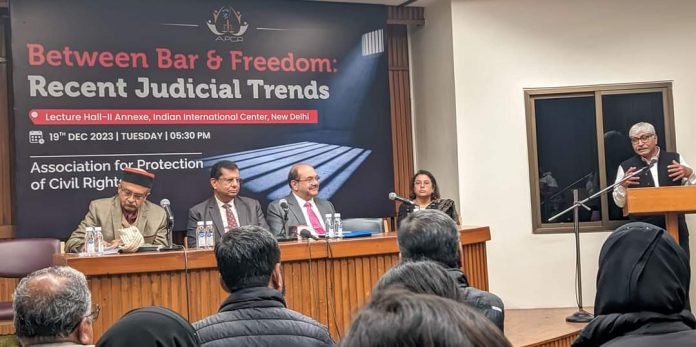New Delhi, Dec. 20: Legal luminaries and other experts shared their views at a public meeting on Between Bars and Freedom: Recent Judicial Trends organized by Association for Protection of Civil Rights (APCR) here Tuesday.
Justice R.S. Chauhan, Former Chief Justice of Uttarakhand High Court and Telangana High Court, while raising a very pertinent question as to why there is delay in dealing with bail applications, said, “The statistics are mindboggling. According to the latest figures available, the number of bail applications has shot up to 4.3 lakhs, out of which 3,00,000 are pending before different high courts. According to the Supreme Court annual report for 2019 to 2020, the Supreme Court had 20,745 bail applications pending that year. In fact, presently 33 percent of the caseload that comes to the Honourable Supreme Court consists of bail applications.”
In order to deal with bail applications, Justice Chauhan suggested that people at the helm of affairs must have courage. The issue of vacancies should be addressed at all levels and media trial should be stopped. For bail reforms should begin with the Judicial Academy where it is taught not to give bail.
Prashant Bhushan, Senior Advocate Supreme Court, said, “Today, virtually more than half of the Opposition MPs have been suspended from Parliament and laws are being passed in their absence without any discussion and even such serious laws like the Criminal Law Amendment Acts which will have far-reaching consequences on the liberty of citizens. The government is emboldened because they feel there is nobody to stop them from doing this, which is a complete emasculation of democracy, emasculation of civil liberties and emasculation of rights under Article 21. Judiciary under the Constitution has been given not just the power, but the duty to ensure that fundamental rights are protected to ensure that the Executive and the Legislature act within the bounds of their power.”
“Problem is with the framing of some of these draconian laws, including the UAPA, earlier TADA, POTA, Narcotics Act and now the new Criminal Law Amendment. Acts are all seeking to create conditions where the police have virtually unlimited powers and where the citizens’ liberty is virtually in the hands of the police or the government,” added Bhushan.
Retd. Justice Abhay Thipsey, Former Justice Bombay High Court and Allahabad High Court also spoke on bail as a rule and jail an exception and spoke on the problems in these regards and suggested ways to deal with it.
Suroor Mandar, Advocate Supreme Court, while recalling the transfer of Justice Muralidhar who was hearing the Delhi violence case when a bench headed by him had expressed anguish over the Delhi Polic’s failure in checking the violence within 24 hours, said that the judiciary at that time could not protect his own man in the judiciary (Justice Muralidhar), how can we think of protecting citizens and their rights.
Fawaz Shaheen, Delhi based lawyer and legal researcher, while presenting the report of APCR on Reform and Reflection: Analysis of Criminal Laws (Amendment Bill, 2023), said, “Decolonizing the criminal justice system is an essential concept that seeks to eliminate the legacy of colonialism and its inherent biases from the legal framework. Unfortunately, the new bill falls short of achieving meaningful decolonization. Instead, it seems a mere distraction, as it retains outdated colonial terminology and relies heavily on text from previous legislation.”
“The absence of a comprehensive overhaul of the criminal justice system is disconcerting. The term ‘overhauling’ implies a much-needed, thorough, and systematic transformation of the existing system. Unfortunately, the current bill appears to be more about relabelling the older provisions than enacting substantial reform. The new bill primarily focuses on expanding police powers without presenting a fresh and innovative approach to criminal law. Instead of embracing a reformative approach to address criminal behavior, the bill seems to widen the scope of criminalization, which can have far-reaching implications for society,” added Shaheen.
The program was moderated by Prof. Apoorvanand of Delhi University.




